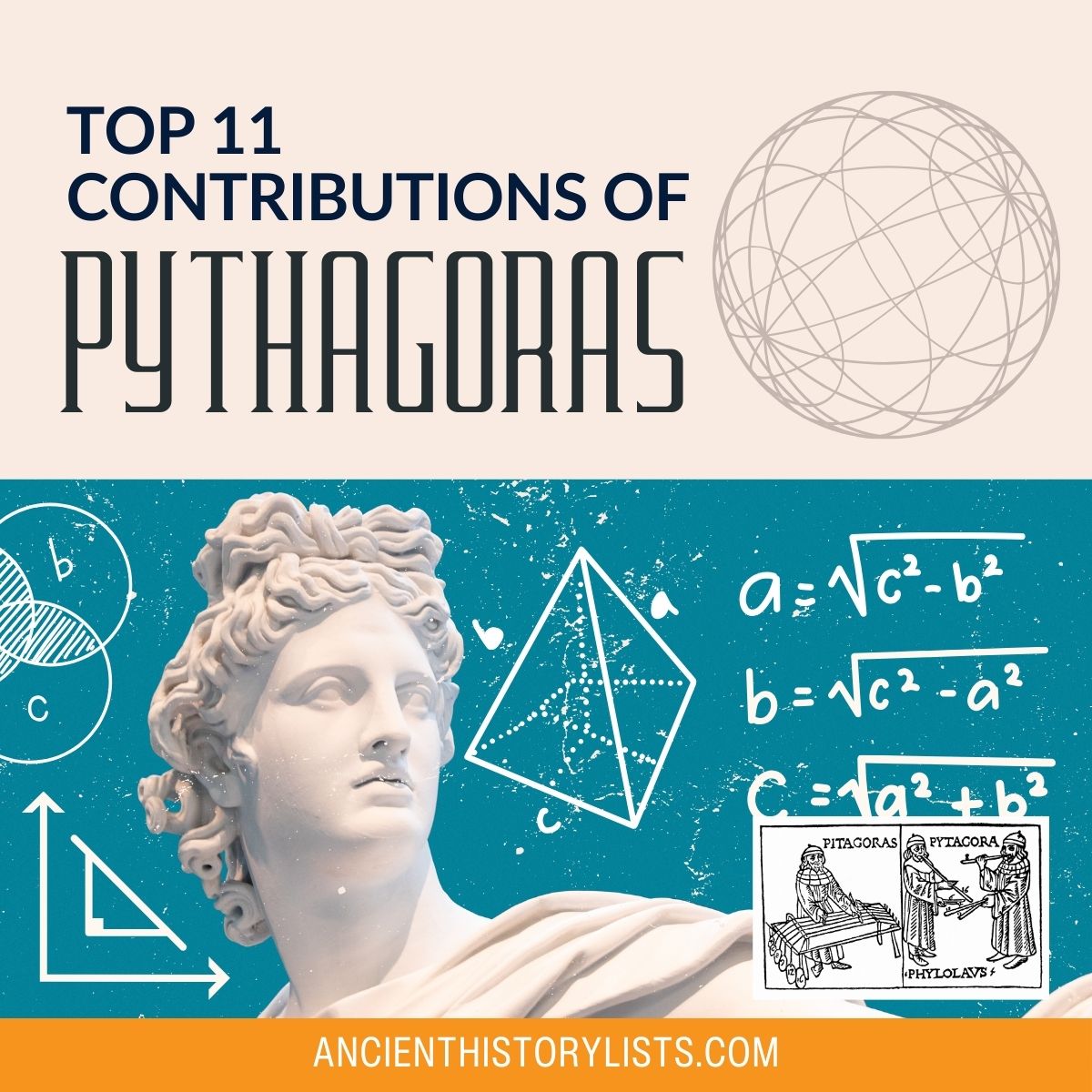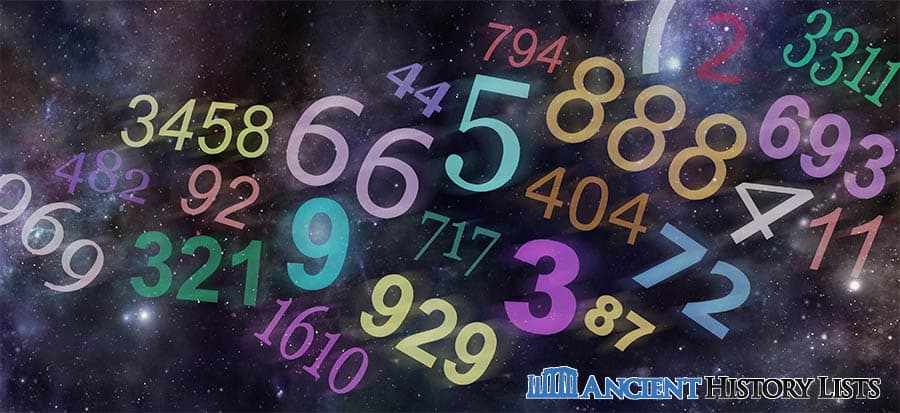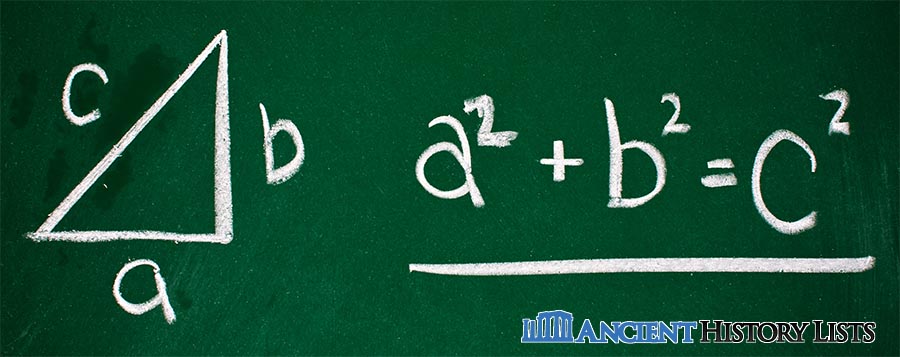A scene from Raphael’s School of Athens shows Pythagoras as a bearded man, thinning on top, and writing with a quill. He is wearing a sleeved tunic spread out over his legs as he bows his head to write, balancing a book on his left thigh.
Before him, a child with long hair presents him with a writing slate. There is another figure of a woman with long hair behind the child, wearing a white shroud. The Middle Eastern philosopher Averroes peers over his left shoulder while another bearded figure, presumably Anaxagoras, peers over his right shoulder and writes notes on a small pad.
The pre-Socratic Greek logician Pythagoras is one of the most famous people in the world, yet he didn’t write any of his theories down, and what we know of him today is from other contemporary or later sources such as the painting described above. Initially from Samos, Pythagoras established a school at Kroton, in southern Italy, which taught both religion and logical thinking.

Here is a list of the top 11 contributions of Pythagoras:
1. Metempsychosis
Even though the details of Pythagoras’ lessons remain unknown, it is possible to get a general idea from other sources such as Aristotle, who writes about the lessons of the Pythagoreans without referencing Pythagoras directly.
One of Pythagoras’ fundamental principles seems to have been metempsychosis, which is the belief that all spirits are godlike and that after death a spirit moves into another body. He is believed to have been reincarnated into the scholar Hermotimus, who beheld the shield of Euphorbus in the sanctuary of Apollo. His last manifestation was as Pyrrhus, a fisherman from Delos.
2. Numerology

As indicated by Aristotle, the Pythagoreans used science in the areas of mystery and spiritualism without functional application. The basic unit, the monad, spoke of the birthplace of all things, and the number two, the dyad, referred to matter. The number seven was sacred because it was the number of planets, the number of strings on a lyre, and because Apollo’s birthday was celebrated on the seventh day of each month.
According to the German scholar Burkert, Pythagoras did not deal with mathematics as we understand it today. Burkert contends that the Pythagoreans were mainly concerned with basic arithmetic, which eventually led to the beginnings of modern mathematics.
3. The Public Way of Life
Both Plato and the ancient orator Isocrates suggest that Pythagoras was an advocate for a new way of life. The school, or organization, that Pythagoras established at Croton operated much like a monastery, and its members shared their assets in much the same way. They were also committed to one another to the exclusion of outsiders. One Pythagorean saying was koinà tà phílōn which meant “All things in like manner among friends.”
There were two groups within Pythagoreanism: the mathematikoi (students) and the akousmatikoi (listeners). The akousmatikoi were generally regarded as “old masters” in enchantment, numerology, and religious teachings, while the mathematikoi were recognized as an innovative group which was more progressive, pragmatic, and scientific.
4. Music and Lifestyle
The pursuit of music may have been associated with the love of Apollo. The Pythagoreans believed that music was a purification for the spirit and had a similar effect to that which medicine produced on the body. One of Pythagoras’ stories reports that when he witnessed some inebriated youths attempting to break into a lady’s home, he sang to them, and the young men’s “furious persistence” was silenced.
Pythagoras was the first person to recommend music as a prescription. He connected music to craftsmanship, design, government, raising a family, fellowship, and self-improvement. He thought it was possible to align the souls to their perfect nature, and through music he performed what he called “soul adjustments”.
Pythagoras also associated arithmetic with music and believed that music should not be seen as a diversion alone. He believed that music was an outflow of harmonia, the divine rule seeking to banish confusion and conflict in the cosmos. Along these lines, music was seen to have a double function as, like science, it empowered people to see into the structures of nature.
The Pythagoreans also set great store by physical exercise and recommended daily morning walks and sporting activities. Periods of self-examination at the beginning and end of every day were likewise advised.
5. Cosmology

Pythagoras was the first person to suggest that the earth was a sphere, but it is not clear what led him to that conclusion. It is possibly connected to his belief that circles were the strongest shape.
His experience of the universe was most likely exceptionally basic: at that time, the earth was still thought to be the focal point of the universe with everything revolving around it. The Pythagorean view of the universe was pretty straightforward and did not take into account any observation of the movements of the planets.
They held the belief that the planets all moved in giant circles, and that when they brushed against one another, they made a sound. They believed that these sounds were melodic harmonies, and this music has come to be known as the Music of the Spheres. This music was not audible because it was a constant background noise.
The Pythagoreans also held the belief that the earth, planets, and stars all circled a central flame, and night and day was caused because of this movement. They believed that a “counter earth” existed on the other side of the flame. Since they felt that fire was more important than earth, the focal point of the universe must be fire.
Pythagoras was the first to perceive that Venus at night and Venus toward the beginning of the day were the same planet.
6. Mathematics

Pythagoras started the idea of a numerical system, and therefore the beginning of mathematics. To the Pythagoreans, genuine numbers were the most vital thing, and numbers make up the world.
7. Religious Lessons
Pythagoras’ religious lessons were based on the principle of metempsychosis, which states that the spirit never dies and is bound to a cycle of reincarnation until it can free itself from this through virtue.
A soul was believed to exist in both animal and vegetable life, even though there is no proof to indicate that Pythagoras thought the spirit could be contained in a plant. It could, however, be contained in the body of a creature, and Pythagoras professed to have heard the voice of a dead companion in the wail of a dog being beaten.
8. Pythagoras’ Theorem

Pythagoras is most famous for his ideas in geometry. He was the first to propose that the square of the hypotenuse (the side of the triangle opposite to the right angle) is equivalent to the sum of the squares of the opposite two sides.
Even though this hypothesis was first put forward by the Babylonians, Pythagoras was first to demonstrate it. It is additionally thought that he invented the tetractys, a triangular figure consisting of 10 points arranged in four rows, with one, two, three, and four points in each row. Pythagoras believed that 10 was the ideal number.
9. Greek Reasoning
Aristotle states that Plato’s reasoning was heavily reliant on the lessons of the Pythagoreans. Plato may also have obtained the idea that mathematical and dynamic ideas are behind logic, science, and morality from Pythagoras. Plato and Pythagoras shared a magical way to deal with the spirit and its place in the material world, and it is likely that both were impacted by Orphism, a set of religious beliefs and practices originating in the ancient Greek world.
10. Early Christianity
The historian Eusebius compares Pythagoras to Moses, while Augustine of Hippo (354–430 AD), the early Christian theologian and philosopher, dismissed Pythagoras’ theory of metempsychosis without actually naming him, yet generally communicated profound respect for him. In On the Trinity, Augustine discusses Pythagoras’ modesty in referring to himself as an “admirer of insight” rather than a “sage”.
At around a similar time, Neopythagoreanism started to become more prominent, and the first century Neopythagorean logician Moderatus of Gades was instrumental in developing Pythagorean number philosophy and categorizing the spirit as a “sort of numerical harmony.”
11. Pythagoras’ Philosophy
Pythagoras established the mysterious society of the Pythagoreans in southern Italy. The Pythagoreans put forward a hypothesis that stated that everything known to humankind could be clarified with numbers, explicitly entire numbers. This rationale made perfect sense to them, and it is easy to see why. Even today, we use numbers for everything from working out wind speeds in a storm to calculating the speed of a vehicle.

Conclusion
Pythagoras made huge contributions in the fields of astronomy, mathematics, philosophy, music and many other areas. He is considered the “father of philosophy,” and this can be seen through his teachings, his theories, and his philosophies. His impact on later philosophers such as Plato cannot be underestimated, and his influence was significant to the point that he could be seen as the most persuasive intellectual of all time.